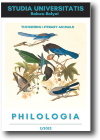MAKING KIN: POSTHUMAN IDENTITY IN ANNE HAVERTY’S ONE DAY AS A TIGER AND KAREN JOY FOWLER’S WE ARE ALL COMPLETELY BESIDES OURSELVES
MAKING KIN: POSTHUMAN IDENTITY IN ANNE HAVERTY’S ONE DAY AS A TIGER AND KAREN JOY FOWLER’S WE ARE ALL COMPLETELY BESIDES OURSELVES
Author(s): Paul Mihai ParaschivSubject(s): Novel, Other Language Literature, Cultural Anthropology / Ethnology, American Literature, Sociology of Literature
Published by: Studia Universitatis Babes-Bolyai
Keywords: posthumanism; speciesism; kinship; identity; becoming; anthropomorphism;
Summary/Abstract: Making Kin: Posthuman Identity in Anne Haverty’s One Day as A Tiger and Karen Joy Fowler’s We Are All Completely Besides Ourselves. Through discussions on anthropomorphism, animal research and posthuman sensibilities, this paper intends to analyse how identity is shaped within the human characters so as to account for practices of kinship and to promote a posthuman model that emancipates from the anthropocentric milieu. In the encounter with narratives that have at their core human-animal interactions, we are generally placed in the position to inquire about the development of identity. Paying closer attention to the emergence of new sensibilities within the human subject in relation to the otherness of the animal, we discover that these narratives can have a tendency to instantiate posthuman becomings and introduce characters that transgress the discriminating “line” that is discussed by Margo DeMello. The “line” itself, although operating through a process of othering, is essentially prejudicial as it aids the creation of species hierarchies. Such is the case with Anne Haverty’s protagonist Marty in One Day as a Tiger and Karen Joy Fowler’s character Rosemary in We Are All Completely Besides Ourselves. The human subjects in these narratives enter relations of kinship with their animals and in doing so, they manage to build patterns for kin-making as a key to eradicate speciesism. Therefore, looking at the differing reactions to animal alterity in the eyes of the human, I hope to capture the plurality of these encounters.
Journal: Studia Universitatis Babes-Bolyai - Philologia
- Issue Year: 67/2022
- Issue No: 2
- Page Range: 155-168
- Page Count: 14
- Language: English

